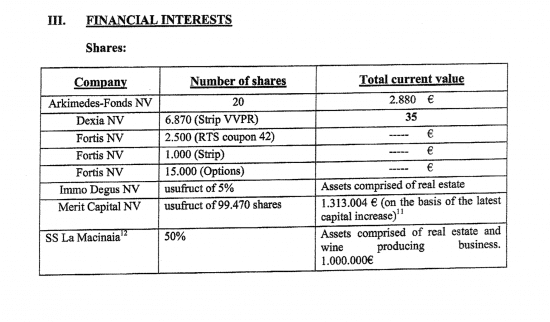The European Union really has many problems these days: economic and finical crisis; Euro crisis; climate crisis; Alcohol crisis; Youth unemployment; right-wing extremism. The list is long obviously. But there are a few crisis that we are all more or less accustomed to already because they’ve been with the European Union for such a long time: political crisis; and especially democracy deficit.
I found this photograph when googling “EU in trouble” and the road sign to the left “Politicians at work” tells a lot, especially together with the one on the right: Democracy is a dead-end road but the EU has anyway taken a different direction.
Both are interconnected obviously and in my work for Active – sobriety, friendship and peace and the beautiful Human Rights Generation campaign, we have addressed some more examples:
The President of the European Commission for example spends €7.5 Million on cocktail parties and expensive gifts every year.
And a week ago I’ve found a blog post called: “Fancy a TTIPPLE? A Deguchtation?” It also had the sarcastic sub-heading “EU trade commissioner Karel De Gucht’s vineyard bears fruit. [We] look forward to the US marketing campaign…”
TTIP means Transatlantic Trade and Investment Partnership, so the blog post is about Trade Commissioner De Gucht‘s obvious conflict of interest in-between policy making, and leading these negotiations for the EU and his personal interests in the wine production.
And especially three provisions in Article 9 D follow suit to give a clear mandate and mission to the European Commission:
1. The Commission shall promote the general interest of the Union and take appropriate initiatives to that end.”
3. The Commission’s term of office shall be five years. The members of the Commission shall be chosen on the ground of their general competence and European commitment from persons whose independence is beyond doubt.”
8. The Commission, as a body, shall be responsible to the European Parliament.”
The European Commission has to act to promote the common good of the entire Union, not one specific country or any other specific interest, like that one of Big Alcohol. This point is emphasised by the European Commission being directly accountable to the European Parliament.
Mr. De Gucht has a million Euro investment in wine production. I can see that this sum might be peanuts. But Mr. De Gucht’s independence is not “beyond doubt”. Not all.
During the tenure of the current leaders in the EU we have had similar headlines concerning Mr. Barroso, the President of the European Commission and Mr. Van Rompuy, the President of the European Council. We se powerful men sitting in the lap of Big Alcohol, praising Big Alcohol and having personal, economic interests in the alcohol industry, while failing to act to control, reduce and prevent alcohol harm in Europe and other parts of the world.
The European leadership, especially the European Commission is not independent “beyond doubt” and obviously doesn’t even make an attempt to be.
And the citizens of Europe are subject to government of the (alcohol) industry, by the (alcohol) industry, for the (alcohol) industry. Or do you think that Trade Commissioner De Gucht will make sure that scientific evidence, the best interest of children in Europe and the US (in case of the TTIP), and the general public interest prevail by excluding harmful commodities like alcohol from the trade talks?
So far, he and his colleagues have failed to, and the crisis in democracy continues – and we might know why.
—
For further reading:
IOGT International Comment On “Proposed Transatlantic Trade and Investment Agreement” 10.05.2013
Press release by Active – sobriety, friendship and peace, 15th October 2010: “Young Europeans alarmed over public health ignorance shown by Council President Van Rompuy. Active sends its updated alcohol policy paper to the European Council President”
Press release by European Youth Forum and Active – sobriety, friendship and peace: “Barroso promotes special interests instead of welfare of young Europeans“

